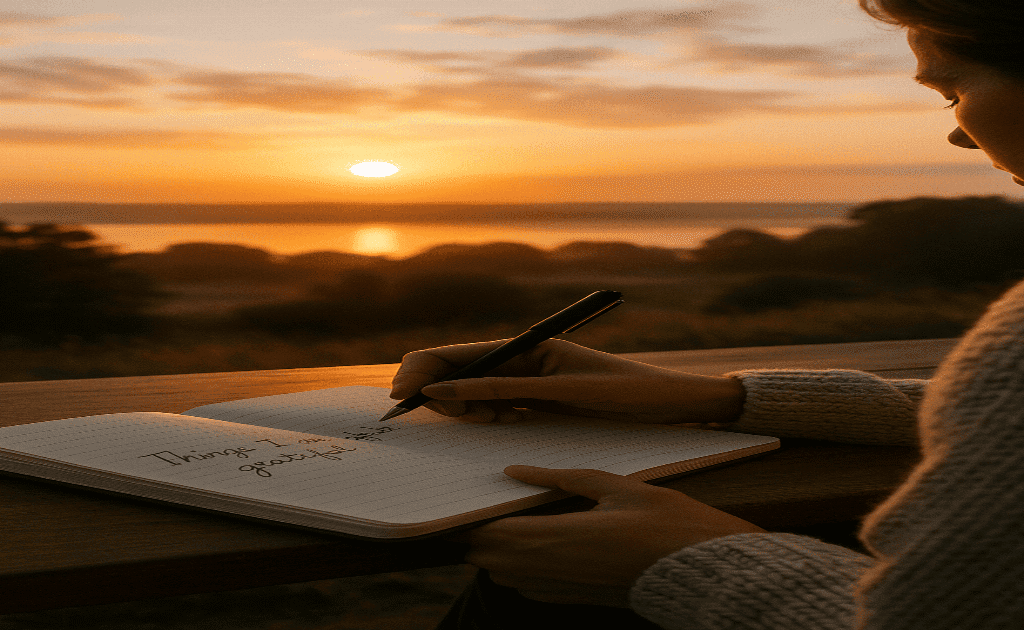Even if it is not your dream job, be thankful you have an income 🤲
Even if today was hard be thankful you had the strength to get through it 💪
Even if the food is not fancy, be thankful you have something to eat 🙌
This is what it means to be grateful🙏. Gratitude turns what we have into enough, it reminds you that there is always something to be thankful for 🤝
It is one thing to be grateful when everything is going well, but what about when life unravels, whether through personal loss, burnout, or global crises. This is even when gratitude becomes more powerful.
In this guide, we will explore the neuroscience and psychology behind gratitude, why it matters most during hardship, and how to practice it authentically without falling into toxic positivity.
The Science of Gratitude: How It Redirects the Brain
Gratitude is a neurobiological process that reshapes how we experience and respond to stress. Science teaches us that gratitude is not just a feel-good practice; it is a proven psychological aid that helps us navigate adversity with greater resilience, clarity, and emotional strength.
Gratitude and the Brain
Studies show that practicing gratitude activates the medial prefrontal cortex, the region of the brain associated with decision-making and emotional regulation. This activation reduces stress and enhances feelings of well-being.
In addition, gratitude practices boost levels of dopamine and serotonin, neurotransmitters that play a role in mood and happiness.
Mental Health Benefits
Research again indicates that gratitude can lead to significant improvements in mental health, including:
- Reduced symptoms of depression and anxiety
- Improved sleep quality
- Improved resilience and satisfaction with life (Source)
Why Gratitude Feels Hard During Hardship and Why That is Normal
I know it might sound strange, but let’s face it, personally, I have always tried to be thankful for difficult moments in my life. When the days do not turn out as expected, I try to look for that silver lining.
But in all honesty, when life knocks hard, it becomes impossible to think of anything to be thankful for. Of course, our minds are programmed to pay attention to threats, something referred to as negativity bias. This bias makes it difficult to notice good things in life, especially during tough times.
But we must also know that forced or artificial displays of appreciation can bring about the feeling of guilt or inadequacy. True appreciation involves acknowledging and appreciating the positives in life without denying the existence of suffering or difficulties. So be grateful and not just practice appreciation.
Evidence-Based Gratitude Practices for Tough Times
Start Small: Be Thankful for One Thing a Day
Begin by noting a single positive aspect of your day, no matter how minor. This practice can help shift your focus from what is lacking to what is present. This can be done by
- Gratitude Journaling
Gratitude journaling is listing a few items you are grateful for on a daily basis. Each night, write down about three things that went well during the day and reflect on why they happened. This exercise has been shown to increase happiness and reduce burnout, stress and depression. (Source, Source)
- Guided Gratitude Practice: A 5-Minute Exercise

Set aside three minutes each day mostly at the end of the day. Reflect on and write down things you are grateful for.
Overtime you realise that throughout your day, whether bad or good you keep looking for things you are grateful for so you can account for at the end of the day.
This simple practice can help reframe your brain to focus on positive aspects of your life in each day.
Practice Mindfulness and Living in the Present
Be thankful and content with what you already have and not always focusing on what you lack. Incorporate mindfulness into your practice of gratitude by engaging in the present moment and being present with it. This can be taking time to enjoy a meal, appreciating nature, or simply being aware of your breath (deep breathing practices).
Gratitude Letters and Anchors
The two most significant obstacles to gratefulness are forgetfulness and a lack of mindful awareness. So, writing gratitude letters to friends, using physical reminders, like a bracelet or sticky note can bring gratitude into your mind throughout your day. This can help to raise your well-being and bonding.
Language Reframing
Gratitude does not mean denying or ignoring the pain, but rather it is a coping mechanism through the painful experience. Hene, it is advisable to speak positivity and not negativity only even when things are not going well as planned.
Be grateful for the Lessons Learnt in Difficult Situations
Most often there are lessons that difficult situations teach us. When we try and identify these lessons, we get a sense of gratitude what whatever we have been through. Reflecting on challenges and considering what they have taught you can help transform adversity into personal growth.
Try to always ask; what lessons can be learned or how can I emerge stronger.
Community and Connection
Sharing your gratitude practice with others can enhance its effects. Consider joining a gratitude group or sharing your reflections with a friend.
Gratitude helps you realise that you would not be where you were if not for other people (Source)
Making Gratitude a Sustainable Habit
In order to make gratitude a part of your daily life:
- Add gratitude to your existing routines (e.g., mindful meditations during your morning coffee).
- Use reminders or apps to facilitate daily gratitude practice. (Source)
- Be patient and kind to yourself as you build a habit of gratitude.
Nature Appreciation
Spending time in nature and acknowledging its beauty can foster a sense of gratitude and interconnectedness.

Final Reflection: Gratitude as an Act of Courage
A person with a grateful mindset tends to find the message in the mess. And even if life knocks them down a grateful person finds even the smallest reasons to get back up.
No matter the season, the struggle or pain always find something to be grateful for. It is the secret to peace. By choosing gratitude, you empower yourself to find meaning and resilience amidst adversity.
Call to Action
What is one thing you are grateful for today? Share your reflections in the comments below or start your own gratitude journal from today.



[…] instance, cultivating gratitude has been shown to boost resilience and long-term well-being. How to Practice Gratitude in Tough Times: A Psychology‑Based Guide offers actionable ways to build this emotional muscle without forcing toxic […]